Common errors with video cards and how to fix video card errors
Faulty video card is a common problem for computer users today. When the video card is faulty, it will greatly affect the displayed image quality, causing discomfort to users. In this article, I will share some knowledge about common video card errors and how to fix them. Let's see it now!
Graphics card (Graphics card) or discrete graphics card is a type of device that helps the computer handle the screen color, resolution and contrast details of the image.
1. Common video card errors
After installing the driver, the card doesn't show up
This is a common error when we attach or replace the video card to the laptop . To fix this error, you can remove the card, restart the computer, remove the driver and go back to the process of assembling and installing the driver.

The card is installed, but the game lags
The cause of this error is that the machine has not installed the correct driver for the video card. In this case, users just need to check what their video card is using and then reinstall the driver to be able to use it normally.

The card does not receive the correct screen resolution
The error of the card not receiving the correct screen resolution also causes poor image quality. To fix this error, try to check if the current version of the driver is installed correctly or you can try reinstalling the driver.

The card is installed correctly, start the machine but no picture
This video card error is caused by not turning off the onboard video card and turning on the discrete video card on the BIOS. To fix this error, turn off the on board card and then use it again normally, refer to the article below.

Video card error causes the screen to go black or blue
Due to the memory of the card is faulty or overheated, causing the laptop screen to be black or blue. To fix this error, use a cooling fan to fix the video card error caused by this cause!
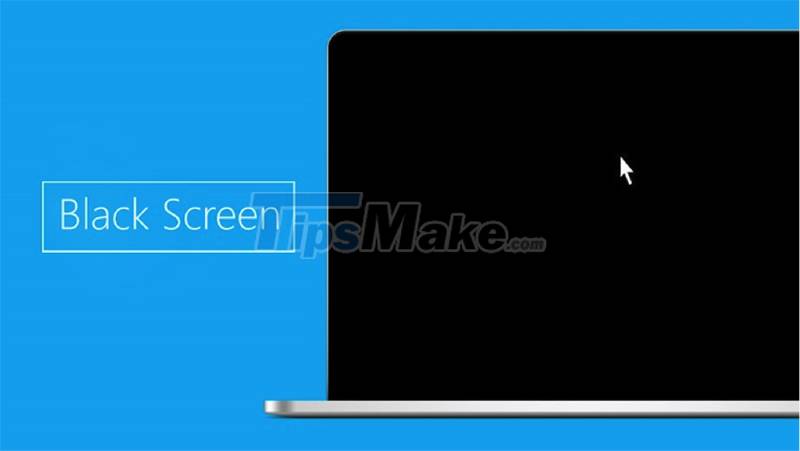
Graphics card not working properly during boot
If your graphics card doesn't work as soon as you start it up, or if you're powering on your PC with no signal on the screen, your card may be faulty. To fix this error, remove the card and bring it to a repair center to check.
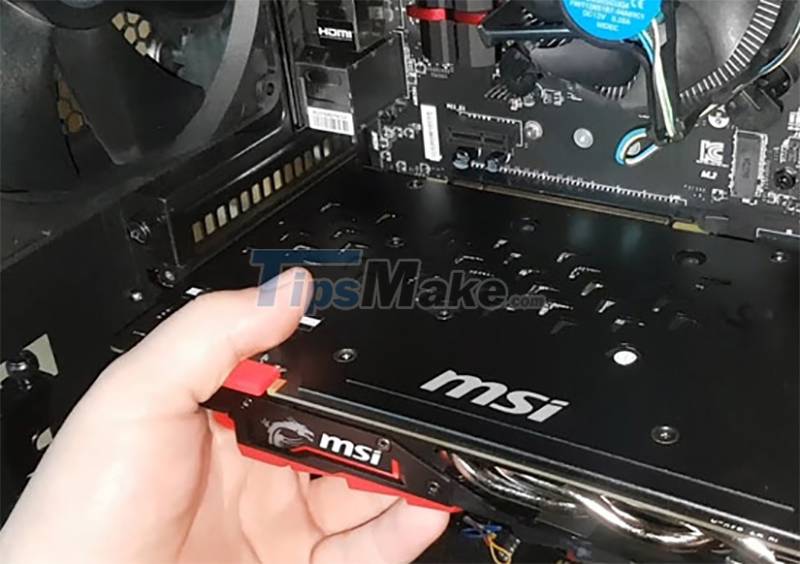
Video card burned chip, capacitor was edematous, exploded .
One of the causes of video card failure is chip burn, swollen capacitor, exploding, etc. If you have this problem, you can check your graphics card in another PC and see if it works. works well or not. If it doesn't work on other PCs, you can repair or replace it.
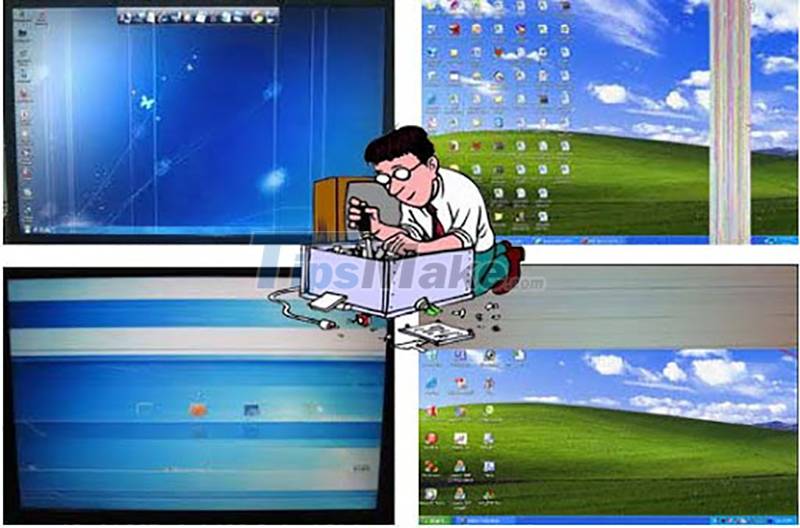
A message out of the scanning range appears on the screen.
The cause of this error is that the monitor is not connected to the output of the video card. To fix this error, try connecting again and then turn on the device to check.

GPU not detected in Windows
When BIOS or GPU failure causes the video card not to recognize properly in Windows. To fix this error, you can flash the graphics card BIOS or the GPU BIOS using GPU flash tools.

2. Notes when installing video card card
How to properly install the video card
One of the reasons why the video card fails is due to improper installation by the user, leading to damage. Please check and make sure that the graphics card is properly installed in the graphics card slot.
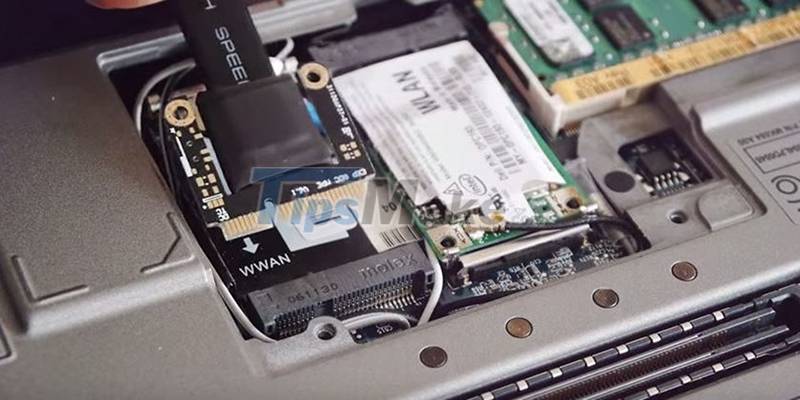
Note when installing video card
Correctly and securely attach the communication port on the main
When replacing or adding a video card, you need to choose and buy the card with the right connection for your computer, when installing it, you need to install the right port and close it to be able to use the graphics card for your computer. screen.
Install the correct driver for the video card
Drivers are an important part of the process of installing a video card for a laptop. After the installation is complete, you must check and download the latest driver for your graphics card.
3. How to handle when the video card fails
Check the graphics card settings, the card is not in the correct slot position
To deal with a faulty video card, the first and foremost thing to do is to check your graphics card settings.
To check the graphics card settings, you can do the following steps:
Step 1 : Turn off your computer completely by clicking the Start icon button on the Taskbar > Select Power > Select Shut down .
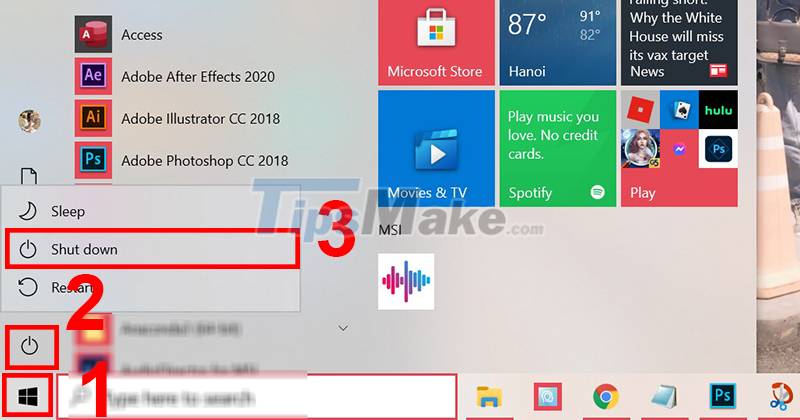
Step 2 : Remove the screws to remove the side cover of the computer and the panel next to the graphics card slot.

Step 3 : Find the video card > Remove the screws holding the back of the graphics card.
If you haven't already, disconnect the video cable that runs to the monitor. Then, remove the back plate that holds the video card down.

Step 4 : The video card is held in place by a clip at the end of the PCI Express card slot. You press down or drag horizontally depending on the mainboard line to unlock it.

Step 5 : Remove the video card from the slot > Connect one or two PCI Express power connectors to the video card > Restart the machine .

Check the power supply/PSU
If your PSU is not powered by the graphics card, it will not be able to provide enough power to the graphics card. As a result, your graphics card may not be recognized by your PC or in Windows. Also, if your graphics card requires 6-pin or 8-pin PCI-E power connectors, be sure to connect them to your PSU to provide enough power for the card to work.
To check the power supply/PSU, you can perform the following steps:
Step 1 : Make sure the power switches on the back of the PSU are not turned off .
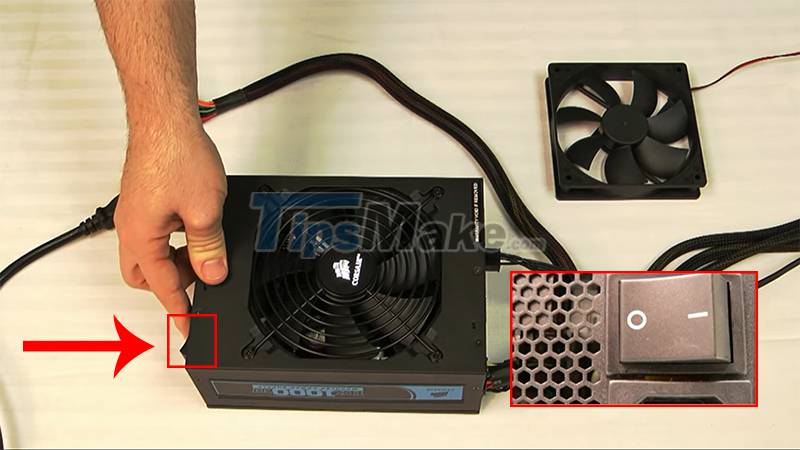
Step 2 : Check that the power cable is firmly attached to the power outlet and power > Try another cable and check the power outlet to make sure they are not damaged.
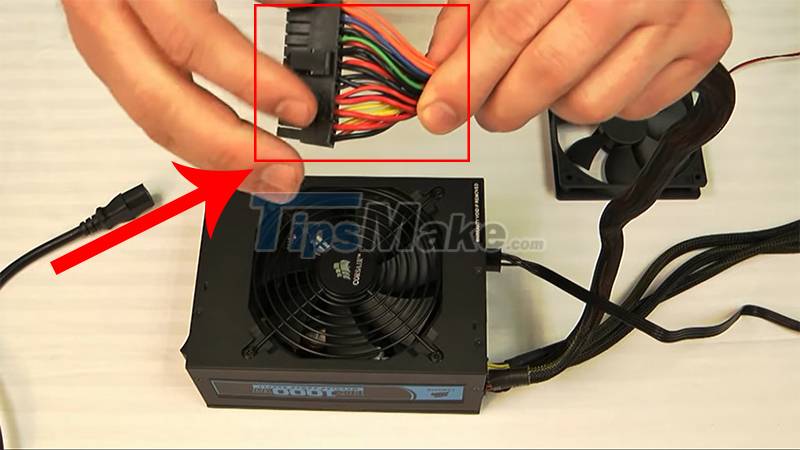
Step 3 : Check the connections in the case , especially the hardware plugs > Remove all components and hardware in the machine except the hard drive to boot the operating system and the discrete graphics card (if you don't have a onboard graphics – integrated card). If your CPU has an integrated graphics card, remove the discrete graphics card as well.

Install the appropriate drivers
To fix video card errors, you must install the appropriate drivers for your graphics card so that the card can work properly. You should download the drivers from the official websites of the graphics card or GPU manufacturer.
You can refer to some links to download drivers for the following video card:
- - AMD driver: download HERE.
- - Driver Nvidia: download HERE.
- - Driver MSI: download HERE.
- - Driver Asuz: download HERE.
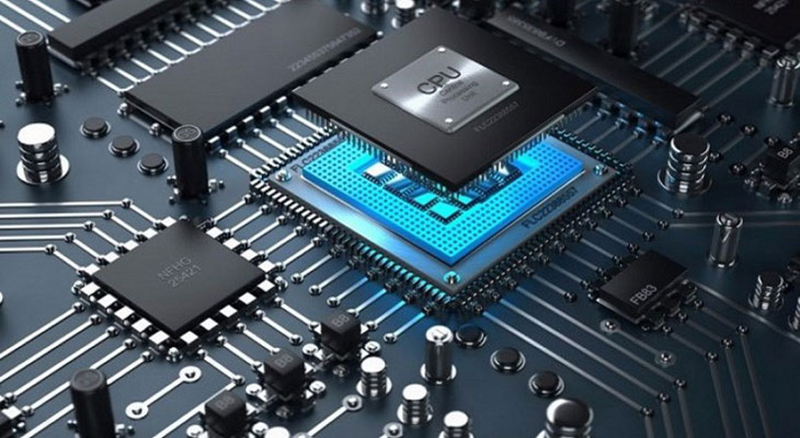
Windows Update
Updating the Windows operating system can lead to this problem when the graphics card is not recognized in Windows. If your graphics card is not detected after a recent Windows update, remove or reinstall that Windows update.
To update Windows, you can follow these steps:
Step 1 : Click the Start icon button on the Taskbar > Select Settings .
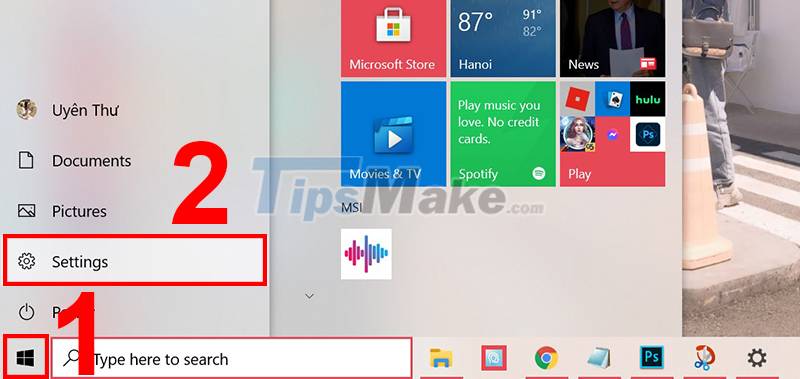
Step 2 : Select Update & Security .
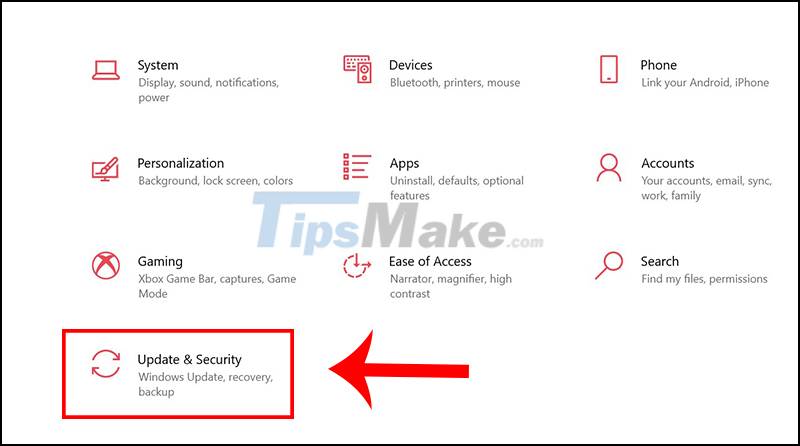
Step 3 : Select Windows Update > Select Install now to update Windows.
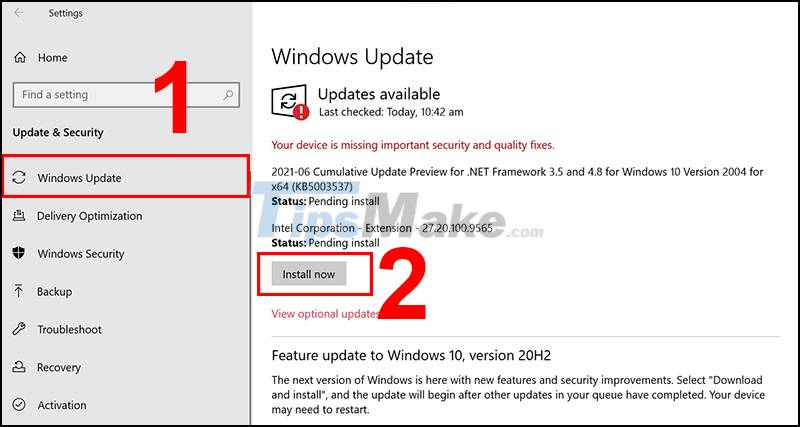
Check display cable (HDMI, DVI)
Due to a display cable such as HDMI, DVI is faulty causing the graphics card to not recognize the monitor. You should check your graphics card's display cable and see if it's working properly.
To test the display cable, you can follow these steps:
Step 1 : Turn off the computer screen by clicking the Start icon button on the Taskbar > Select Power > Select Shut down .
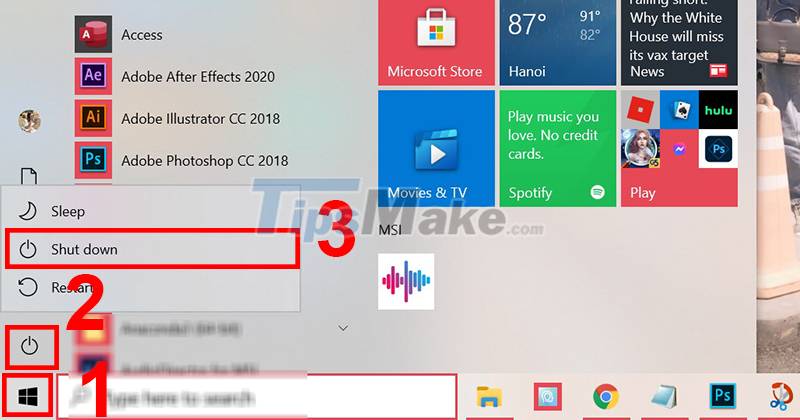
Step 2 : Disconnect the HDMI video cable from both ends > Disconnect the monitor's power cable from the back/bottom of the monitor.
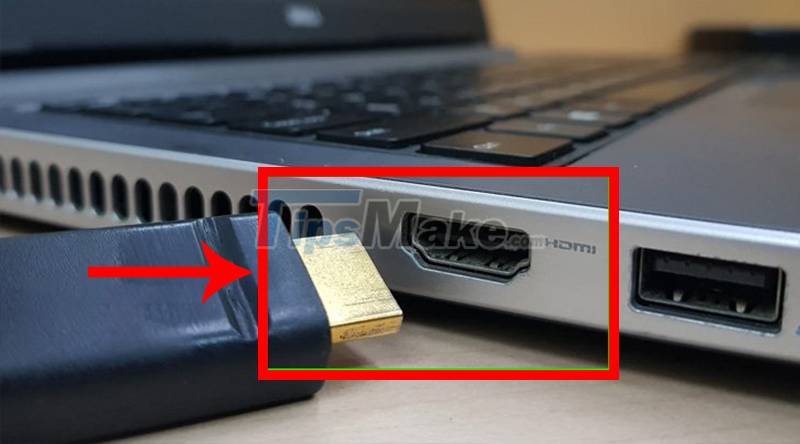
Step 3 : Reconnect the power cable to the monitor > Reconnect the HDMI video cable .
Note: The other end of the cable must be plugged directly into an electrical outlet. No UPS or surge arrester.

Motherboard compatibility issue
Video card errors can occur because the graphics card is not compatible with your old motherboard. You can try updating the BIOS to help support the new graphics card. You should download the latest BIOS version from the manufacturer's website.

Broken GPU BIOS (BIOS)
If your graphics card's BIOS or GPU is damaged, your graphics card won't recognize it properly in Windows. You should let the graphics card work at normal VGA resolution using windows default VGA drivers then flash the graphics card BIOS or GPU BIOS using GPU flash tools.
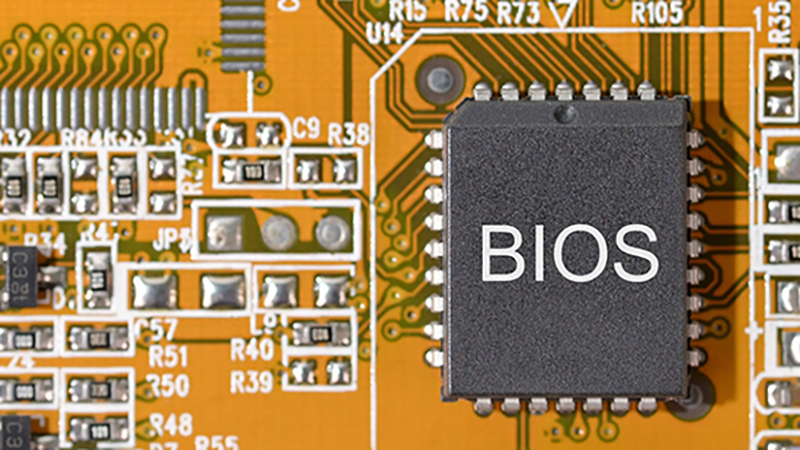
When the Graphics Card fails
If the graphics card is faulty or damaged then you can test your graphics card in another PC and see if it works fine. If it doesn't work on other PCs then you can have it repaired or renewed, if it's still within the warranty period.
Hopefully, after reading this article, you have had the knowledge about common video card errors and how to handle them when the video card fails. Thank you for reading the article, see you in the next post!